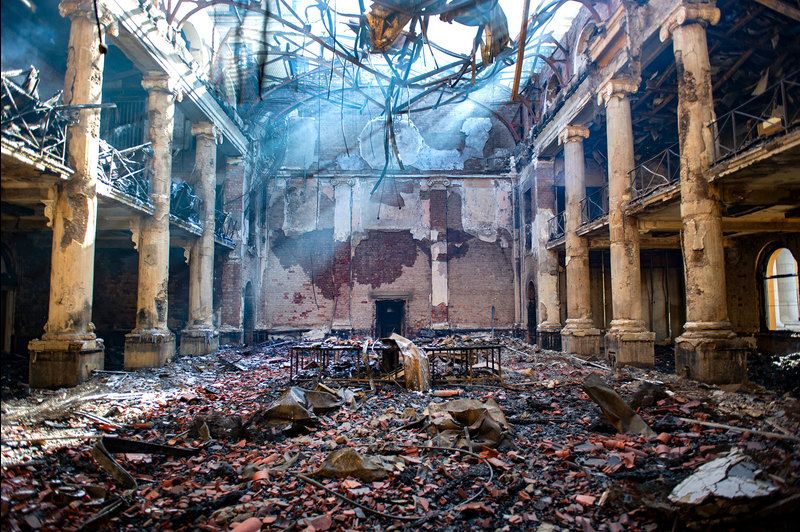Why the Cape Town Fire Is a Devastating Loss for South African Cultural Heritage
The inferno destroyed much of the University of Cape Town’s special collections, including rare books, films, photographs and records
:focal(1867x1130:1868x1131)/https://tf-cmsv2-smithsonianmag-media.s3.amazonaws.com/filer/36/ee/36ee6453-d9e9-4953-960a-778d9586b8e9/gettyimages-1232382436.jpg)
A wildfire that sparked on the slopes of South Africa’s Table Mountain raged across the University of Cape Town (UCT) on Sunday and into Monday, damaging or destroying a number of historic structures and campus buildings.
Among the most significant losses were the university’s Plant Conservation Unit offices and the Jagger Reading Room, which housed priceless artifacts related to African history, including 19th-century watercolors painted by Indigenous peoples, maps, manuscripts and government records, according to Nature’s Linda Nordling.
Though the fire is now under control, the full extent of the devastation—both to the South African institution and the study of African history—remains unclear.
“We are of course devastated about the loss of our special collection in the library, it’s things that we cannot replace. … [I]t pains us to see what it looks like now in ashes,” UCT Vice Chancellor Mamokgethi Phakeng tells the New York Times’ Christina Goldbaum and Kimon de Greef. “The resources that we had there, the collections that we had in the library were not [just] for us but for the continent.”
The blaze broke out on the lower slopes of nearby Devil’s Peak, a spur of Table Mountain, around 9 a.m. Sunday, rapidly spreading down the mountain to the university campus. Per a UCT statement, about 4,000 students were evacuated from nearby residences and moved to temporary housing.
Authorities are currently investigating the cause of the fire, which was one of several sparked in the area over the weekend. As Odwa Mkentane reports for the Cape Times, authorities are investigating the possibility that an arsonist started at least one of the blazes. Police took a 35-year-old male suspect into custody on Sunday night.
/https://tf-cmsv2-smithsonianmag-media.s3.amazonaws.com/filer/99/a9/99a944c3-e202-4d20-9050-05552ebbb107/uct_image_provided.jpeg)
Strong southeasterly winds pushed the fire toward Cape Town’s densely populated neighborhoods, where flames engulfed campus buildings and a hillside restaurant attached to the Rhodes Memorial, which commemorates British colonialist Cecil Rhodes. The blaze also destroyed Mostert’s Mill, a 225-year-old structure that was the country’s oldest working windmill.
More than 200 firefighters and emergency personnel worked to battle the flames alongside four helicopters, reports Lesley Wroughton for the Washington Post. Three firefighters were hospitalized with serious burns, but no other casualties were reported, Cape Town security officials tell the Post. In total, the fire destroyed around 1.5 square miles of land.
The greatest loss may be felt at the Jagger Reading Room, which forms part of the UCT Libraries’ Special Collections and holds many unique and irreplaceable items that tell the story of South African history. Though library directors have yet to assess the scope of the loss, Phakeng confirmed to CapeTalk Radio that the blaze destroyed at least a portion of the Jagger archives’ collections.
“The library is of course our greatest loss,” Phakeng said, as quoted by the Post. “Some of these cannot be replaced by insurance, and that is a sad day for us.”
Pippa Skotnes, curator of the school’s archive, tells the Times that the university’s African film collection was among the losses. The archive boasted some 3,500 rare African archival films and was one of the few of its kind in the world. University librarians had been working to digitize the films, but the process is extraordinarily time- and labor-intensive, so just a “wafer thin” sliver of the total collections had been preserved, library manager Niklas Zimmer tells the Times. (Individuals with photos or digital scans of the library’s collections are encouraged to upload their files to this online portal.)
According to a statement, UCT’s Special Collections also include a range of print and audiovisual artifacts related to African studies. These holdings represent one of the most expansive selections of rare books, photographs, films, letters and other primary sources documenting South African history—including a robust trove of materials related to the fight against apartheid, per the Times.

The Jagger building itself dated to the 1830s and had recently been renovated, notes Artforum. Officials are holding out hope that the flames failed to reach the bulk of the archive, which is stored in two basement floors protected by fireproof doors. Still, the Times reports, many fear that firefighting efforts inadvertently flooded the basement with water.
“At this stage, we can confirm the Reading Room is completely gutted,” says UCT Libraries’ executive director, Ujala Satgoor, in a statement. “… [T]hankfully the fire detection system in place triggered the fire shutters thereby preventing the spread of the fire to other parts of the Library.”
Speaking with CapeTalk Radio, Skotnes says that watching the fire burn was “absolutely devastating.”
“I’ve had calls from scholars from around the world who remember working in the reading room on the top floor, which is completely destroyed,” Skotnes explains. “All those scholars who have been recently working in there with the collections they were working on, all that work would have gone, all that material would have been destroyed.”
Sarah Emily Duff, a historian of South Africa at Colby College, tells Nature that the Jagger archive “is special for all sorts of reasons, and for me it’s because it includes collections which provide a record of the ordinary lives of ordinary people in the area—from working-class children to Black students attending night school.”
She adds, “We lose that texture of everyday life and struggles with a catastrophe like this.”
/https://tf-cmsv2-smithsonianmag-media.s3.amazonaws.com/accounts/headshot/nora.png)
/https://tf-cmsv2-smithsonianmag-media.s3.amazonaws.com/accounts/headshot/nora.png)